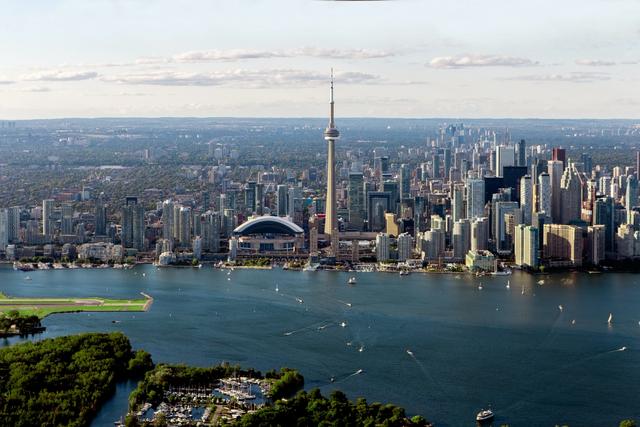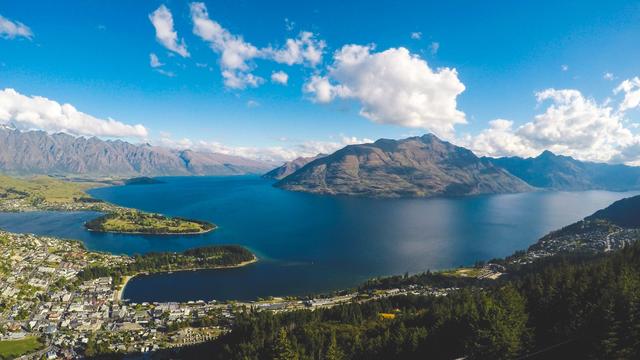Best Places to Live and Work Abroad
Gary O’Driscoll
Head of Private Clients
Not so long ago, moving to another country to work typically meant one of two things had to happen: you could transfer to your company’s overseas office or you found a new job in the destination you dreamed of living and working in. Then the Covid-19 pandemic struck, reshaping the workplace landscape almost overnight.
Remote working was already a rapidly growing trend before the pandemic blindsided businesses, as workers sought flexible alternatives to the traditional nine-to-five routine and the time-consuming commute. Suddenly, under the confines of lockdown, home working became a forced necessity rather than a convenient and occasional alternative to the office - and many of us had a lightbulb moment: this new flexible way of working could allow us to do our job from anywhere in the world.
Armed with a laptop, an internet connection, and Zoom - and with the support of forward-thinking employers who recognise the benefits of flexible working practices - increasing numbers of people are turning this dream into reality. Now they can add flexible working to an already compelling list of reasons to try a new country: cost of living, spacious homes, better health, and the weather.
If you’re planning on joining this international remote working revolution or you intend on exploring a more traditional emigration route, you will want to know the best and most popular places to live and work abroad. To help you make an informed decision, we have done some research for you.
Save with a currency specialist
Canada

The globe's second-biggest country is revered for its dazzling array of landscapes across six time zones - from towering mountains and glittering glaciers to spectral rainforests and remote beaches. And while the great outdoors and mind-boggling amount of space is what attracts people to visit in the first place, other factors also combine to convince them to stay: economic and political stability, affordable cost of living, low crime rate, friendly locals, and world-class cities. Canada’s spectacular surroundings are complemented by enticing cities like cosmopolitan Toronto, ocean-fringed and mountain framed Vancouver, and French-infused Montréal.
Implemented in 2015, the Express Entry system has allowed thousands of highly skilled workers to emigrate to Canada from across the globe. The system is designed to streamline the Canadian visa application process and make it more accessible to foreigners hoping to live and work there. To qualify through Express Entry you must be eligible for one of the following immigration programmes: the Federal Skilled Worker Programme, the Federal Skilled Trade Programme, or the Canadian Experience Class.
Portugal
Get your moving overseas checklist ready and make sure you have sharpened your pencil because you’re going to need it. Delicious food and wine? Tick. Easy to reach? Tick. Excellent healthcare? Tick. Affordable homes? Tick. Captivating cities? Tick. Golden beaches? Tick. Plentiful supply of sunshine? Tick. Portugal really does tick all the boxes for those wanting to live and work overseas.
If you’re still chewing on the end of your pencil wondering if it’s the right place for you, the list goes on: it offers a variety of lifestyles, taxes are low, and it’s very expat-friendly. And, it’s much less densely populated than home - there are just 113 people per square kilometre, compared to 420 in England!
As Britain took its first tentative steps into life outside the EU, it was pleasing to hear that Portugal will have a reasonably relaxed process for Brits hoping to live and work there. Three types of visa are available, depending on your circumstances:
- Golden visa: allows those who buy a property worth €500,000 or more to obtain a five-year residence permit, after which you have the option to apply for permanent residency or a Portuguese passport. You only have to spend seven days a year in Portugal to be eligible.
- NHR Scheme: allows for most foreign income to be exempt from Portuguese taxation for ten years. For example, if you are employed outside of Portugal you can avoid tax completely on this income.
- D7 Visa and Residence Permit: aimed at those that are retired or living off their own income and have an income that’s above the Portuguese minimum wage, which, as of 2021, is around €665 per month. You have to spend at least 183 days in Portugal to qualify.
Australia
When it comes to favourable global rankings - whether it’s happiness, quality of living or most liveable cities, you name it - you can almost guarantee that Australia will feature somewhere in the top ten. And it’s easy to see why: low unemployment, high salaries, beachfront cities, plenty of space - Australia’s landmass is about 50% greater than Europe - and a sun-drenched outdoor lifestyle in spectacular surroundings.
Whether you choose Melbourne’s cosmopolitan vibe, Sydney’s glorious harbour and beaches, Perth’s remote tranquillity or somewhere more rural - which won’t be hard in such a vast land with just 22 million inhabitants - you’ll be the envy of everyone you know. Once you make this ancient land your new home you’ll be blessed with endless summers, easy living, and adventures as vast as the horizon.
Before you start booking your flight to the other side of the world, however, the first step is to find the right visa for you. Australia’s skilled occupations list shows which skills are most in demand in the country. If your occupation is on the list you can make an expression of interest to the Australian government. One of the most common ways to live and work there is via the Temporary Skill Shortage visa, which lets an employer sponsor a suitably skilled worker to fill a position they can’t find a suitably skilled Australian to fill.
Make quick, easy and secure payments
New Zealand

Much like its Antipodean sibling across the Tasman Sea, New Zealand - known affectionately by Kiwis as the Land of the Long White Cloud - offers its residents a high quality of life in stunning surroundings. From the breathtaking national parks - where you’ll marvel at sweeping beaches, rolling green hills, primeval forests, snow-capped mountains, and awe-inspiring fjords - to the world-class surfing and skiing, they do action-packed and mellow in equal measure around here.
New Zealand is a tale of two islands: the north with its cosmopolitan cities and authentic Māori culture; and the south with its majestic mountainous landscape. While they differ aesthetically, both islands are aligned socially, with a low cost of living, uncrowded communities, welcoming locals, and a low crime rate.
If you have specialist skills or work in an area of skills shortage, and have a qualification that is comparable to those that New Zealand employers require, you are well-placed to start choosing the right visa, which fall under two categories: temporary and resident - which you must be aged 55 or under to apply for.
- Temporary visas: allows you to live and work in New Zealand for a set period. This can be used as a step towards gaining residence and settling in New Zealand permanently.
- Resident visas: generally allow you to live and work in New Zealand indefinitely and access most publicly funded services. The Skilled Migrant Category determines eligibility using a points system based on factors such as age, work experience, qualifications, and an offer of skilled employment. Another option is the Residence from Work visa.
United Arab Emirates (UAE)

When you hear the UAE mentioned, you would be forgiven for automatically thinking of Dubai’s iconic towering skyline, palm-shaped islands, city-sized malls, indoor ski slopes and sumptuous beach resorts. But beyond the razzmatazz of this world-famous city awaits another six emirates, each with its own character and allure - such as oil-rich Abu Dhabi, the UAE's capital.
The significant expat community - which makes up around 80% of the total population - is testament to the UAE’s global appeal. People are drawn here by the tax-free earnings, high standard of living, and job opportunities, all of which are enjoyed in salubrious surroundings that bask in year-round sunshine.
You can apply to live and work as residents in the UAE if you are:
- Employed by a company in the UAE - the company will apply and sponsor your residence visa while you are in the UAE.
- Employed by the government sector - the government entity will apply and sponsor your visa while you are in the UAE.
- An investor in a business in the UAE - you must process and apply for your visa under the sponsorship of your company’s registered name.
- Buying a property in the UAE - your residence visa will be sponsored under the property you own.
- A dependent sponsored by:
- someone who is employed in the UAE
- an investor/business owner in the UAE
- a property owner in the UAE
A Remote Work visa permits you to live in the UAE and continue working for your existing employer, outside the UAE. The visa is valid for one year.
What next?

You have done your research and decided which country ticks all the boxes. The next step on your journey is to start arranging your move there. The words logistics and admin might not fill you with excitement but you need to be organised if your move is going to be a success. A great way to make a headstart is to draw up an emigration checklist, which should look something like this:
- Understand the healthcare system
- Get to grips with the tax rules
- Apply for jobs (if necessary)
- Apply for a visa
- Open a bank account
- Open an account with a currency specialist
- Search for a property
- Budget for moving costs
- Book your flights
Choosing a currency specialist
Opening an account with a currency specialist is an easy thing to check off your to-do list. It takes just a few seconds over the phone or online and you don’t need to pay in any money or fill out long forms. But why is it so important?
Currencies strengthen and weaken each day because banks and investors purchase huge volumes in response to political and economic news. Positive news about a country typically causes the value of the currency to rise (“strengthen”) while bad news causes it to fall (“weaken”). That’s why currencies fluctuate. We also know when they might move, because we often know when political events will occur and the economic calendar shows us when influential data will be released. However, there will also be news that happens without warning - anything from a US president tweeting late at night to a fall in the price of bauxite. But what we cannot predict – and no one can – is whether they will move up or down or by how much. Even slight fluctuations can make a big difference to the price of your international payments - potentially denting your emigration budget.
Take the Covid-19 pandemic for example: back in March 2020, when the true extent of the pandemic became clear, the pound sunk to its lowest level against the dollar since 1985 and its lowest level against the euro since the depth of the financial crisis 11 years earlier.
This exposure to currency risk brings the need to stay in control of your costs when moving overseas into sharp focus. The bills will soon mount up and exchange rate changes can make budgeting difficult. With a bit of planning, however, you can enjoy seamless and convenient money transfers at a fixed rate.
A currency company that specialises in helping people move overseas successfully can work in partnership with you to protect your funds from this risk - whether you’re sending money to your new home or back to your country of origin. For example, having made your move, you might need to send money back the other way for various reasons: as a gift, to pay maintenance bills on a property or further down the line you might decide to buy a property back home when your adventure is over - all of which will expose your finances to the unpredictable world of exchange rates.
Clear Currency
Clear Currency specialises in helping clients that are moving overseas to save money when making international payments - both large and small.
Transferring large sums of money into another currency and transferring them overseas can be daunting and confusing. Aware of this, we use our knowledge and experience to cut through the jargon and give you a friendly and personal service.
We recognise that it’s impossible to accurately predict how exchange rates will perform; therefore, it’s prudent to plan for all eventualities. With this in mind, we will assign you a dedicated account manager. In addition to helping you benefit from quick, easy, reliable and secure transfers, they can help you mitigate the impact of currency risk on your budget.
Your account manager will work in partnership with you throughout the moving process - and beyond. For example, before you make an international payment, they can prevent the cost of doing so from escalating. Because fluctuating exchange rates make it hard to judge how much you’ll pay at any one time, your account manager can help you execute a forward contract to secure the cost of your payments. This allows you to lock in an exchange rate for a date in the future, securing the price of your international payments when the time comes to execute them - keeping your dream move on track.
Find out what you could save today
Related Articles
How to Mitigate Foreign Exchange Risk
Currency risk can have a significant effect on the efficiency and profitability of any international business. Each exchange rate movement affects how much you receive from sales and what you pay to suppliers.
Read more
Moving to Dubai from the UK: Checklist
You’re ready for a new life overseas and have decided you’re moving to Dubai. Now it’s time to consider the various costs involved, from your visa and accommodation, to health insurance, shipping your belongings and bringing your beloved pets along too.
Read more
Currency Outlook Quarter 1 2023
Clear Currency looks back at the performance of the US dollar, euro and sterling in Q4 2022, and assesses what might be in store for Q1 2023.
Read more



